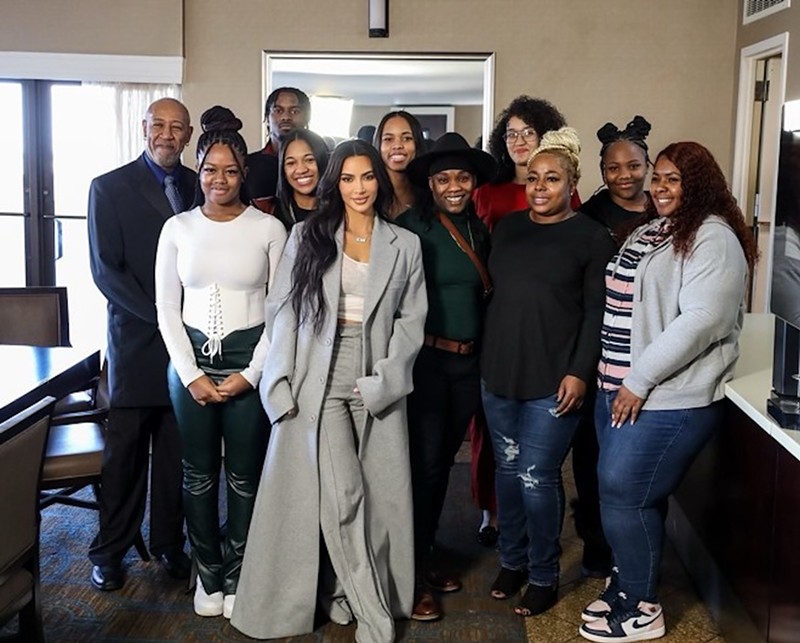The Ohio Parole Board voted 5-0 against clemency for Kevin Keith, who is now 29 years into a life sentence (a sentence that had been commuted from the death penalty in 2010 by then-Gov. Ted Strickland, who could not ignore the “troubling” questions left unanswered in Keith’s case).
The decision on Keith’s fate in this request for clemency (read: release from prison) now rests with Gov. Mike DeWine.
There’s no timeline, per se, for DeWine to act on this matter, but he has the unilateral power to grant Keith’s request for clemency, finishing what Strickland started. To be clear, the matter is Keith’s innocence. Or, with a bit more nuance, the matter is the reasonable doubt cast on Keith’s case by hard evidence discovered while he sat in prison.
Simply reading the state’s account, though, one wouldn’t have the faintest clue: “The case has had ample appellate review to address any alleged irregularities in the processing of the case,” the board wrote. “While the applicant’s conduct and activities are laudable, they do not rise to the level of significance to offset the death of three persons and serious injury to another three. In the judgment of the Parole Board, neither the grounds set forth [in] the application nor facts disclosed by way of our inquiry warrant the exercise of the clemency power at this time.”
Over the years, attorneys have attempted multiple avenues of relief. That’s the nature of wrongful conviction cases; rarely do prosecutors relent on the first spin through the appellate courts. Thus far, no one in Keith’s corner has found success. He remains in prison for the 1994 murders of three people (two women and a child) and the assault of three more (a man and two more children).
Over the years, attorneys have attempted multiple avenues of relief. That’s the nature of wrongful conviction cases; rarely do prosecutors relent on the first spin through the appellate courts. Thus far, no one in Keith’s corner has found success. He remains in prison for the 1994 murders of three people (two women and a child) and the assault of three more (a man and two more children).
And yet the state’s case has earned something of a reputation for its inconsistencies and unanswered questions, with Keith’s arguments drawing supportive voices and public interest like a snowball gathering mass. Most recently, Kim Kardashian (among the most well known celebrities on the planet, let’s just say) produced an eight-episode podcast series that examined Keith’s case in-depth. For a spell, Kardashian’s podcast was the most popular such product on Spotify, which holds the exclusive license.
A podcast is not a legal document, of course, but the parole board’s unwillingness to at least engage the baseline level of doubt in Keith’s case—now, with layers and layers of evidence entered into the record and examined by the media—leaves the public wondering: Who are they kidding?
“I’m really hopeful with this podcast, just to get your story out there,” Kardashian tells Keith in the first episode of the series, “because I think it’s so important for people to understand that our system is so fucked up.”
To elaborate on that last point, Kardashian traveled to Keith’s neck of the woods and joined a panel discussion Jan. 19 in Columbus.
Hosted by the Ohio Innocence Project (OIP) and OIP’s collegiate network, OIP-u, “A Question of Innocence: The Case of Kevin Keith” brought law students and Buckeye State luminaries to a quiet ballroom in a downtown hotel. Kardashian, perhaps the guest of honor on some level, was joined onstage by attorneys Rachel Troutman; James Wooley; Justin Herdman; OIP program director for policy, legalization and education Pierce Reed; and The System executive producer Lori Rothschild Ansaldi. The discussion ranged from the basic sketch of Keith’s criminal case to the more complex emotional reaches of wrongful convictions in the U.S.
“I’m really hopeful with this podcast, just to get your story out there,” Kardashian tells Keith in the first episode of the series, “because I think it’s so important for people to understand that our system is so fucked up.”
To elaborate on that last point, Kardashian traveled to Keith’s neck of the woods and joined a panel discussion Jan. 19 in Columbus.
Hosted by the Ohio Innocence Project (OIP) and OIP’s collegiate network, OIP-u, “A Question of Innocence: The Case of Kevin Keith” brought law students and Buckeye State luminaries to a quiet ballroom in a downtown hotel. Kardashian, perhaps the guest of honor on some level, was joined onstage by attorneys Rachel Troutman; James Wooley; Justin Herdman; OIP program director for policy, legalization and education Pierce Reed; and The System executive producer Lori Rothschild Ansaldi. The discussion ranged from the basic sketch of Keith’s criminal case to the more complex emotional reaches of wrongful convictions in the U.S.
“In a wrongful conviction, justice has not been served for anybody,” Reed said. While the facts of the matter have not changed since Keith’s conviction in 1994, the known facts of the matter have. Evidence has been entered into the record, experts have testified to the level of doubt shadowing Keith and a sitting governor has reported enough concern about this case to halt Keith’s planned execution. Six victims remain unmoored from the justice system, awaiting a final say on the open questions about what happened to them so many years ago.
So, what now? It’s just one more open question in Keith’s case, the perennial question.
The clemency matter now rests in the governor’s hands, echoing the 2010 hearing that saw Strickland spring Keith from Death Row. Not for nothing, Strickland’s decision followed a unanimous Ohio Parole Board decision, 8-0, to deny Keith clemency as he awaited his execution.
DeWine has only dealt with two other clemency votes from the state’s parole board. In January 2019, on the day of his inauguration, the board voted 8-0 against clemency for Warren Henness (convicted of the 1992 murder of Richard Myers in Columbus). DeWine upheld the position, though he didn’t exactly say as much; he delayed Henness’s execution to Dec. 17, 2024.
In April 2020, the board actually voted 6-2 in favor of clemency for Gregory Lott (convicted of the 1986 murder of John McGrath in East Cleveland). DeWine went on to delay Lott’s execution, but has not taken the recommendation of the parole board on this case. Lott is currently scheduled to be executed by the state of Ohio on Feb. 15, 2024, though there's an unofficial moratorium on executions in the state for a variety of reasons. His next clemency hearing is listed as “TBA” on the Ohio Department of Rehabilitation and Correction’s website.
(N.B.: The board’s report on Henness was 27 pages. For Lott, 16 pages. For Keith, one page.)
How or when DeWine will act on the board’s unfavorable clemency vote for Keith remains an open question, although constituents could hardly be blamed for withholding any benefit of doubt.
More broadly, Keith also maintains a pending case before the Sixth Circuit Court of Appeals, but this is another example of how tricky these post-conviction cases can be. As Troutman pointed out during the panel discussion, cases like Keith’s develop “calluses” as they circulate in courtrooms over time. Each successive attempt at relief is just that much harder to win. The state has grown a thicker skin, with that much more paperwork to point to and say (paraphrasing here), “Look: We’ve already stated our position on this case,” never mind the exculpatory evidence that’s dripped into the public record over time.
So, what now? It’s just one more open question in Keith’s case, the perennial question.
The clemency matter now rests in the governor’s hands, echoing the 2010 hearing that saw Strickland spring Keith from Death Row. Not for nothing, Strickland’s decision followed a unanimous Ohio Parole Board decision, 8-0, to deny Keith clemency as he awaited his execution.
DeWine has only dealt with two other clemency votes from the state’s parole board. In January 2019, on the day of his inauguration, the board voted 8-0 against clemency for Warren Henness (convicted of the 1992 murder of Richard Myers in Columbus). DeWine upheld the position, though he didn’t exactly say as much; he delayed Henness’s execution to Dec. 17, 2024.
In April 2020, the board actually voted 6-2 in favor of clemency for Gregory Lott (convicted of the 1986 murder of John McGrath in East Cleveland). DeWine went on to delay Lott’s execution, but has not taken the recommendation of the parole board on this case. Lott is currently scheduled to be executed by the state of Ohio on Feb. 15, 2024, though there's an unofficial moratorium on executions in the state for a variety of reasons. His next clemency hearing is listed as “TBA” on the Ohio Department of Rehabilitation and Correction’s website.
(N.B.: The board’s report on Henness was 27 pages. For Lott, 16 pages. For Keith, one page.)
How or when DeWine will act on the board’s unfavorable clemency vote for Keith remains an open question, although constituents could hardly be blamed for withholding any benefit of doubt.
More broadly, Keith also maintains a pending case before the Sixth Circuit Court of Appeals, but this is another example of how tricky these post-conviction cases can be. As Troutman pointed out during the panel discussion, cases like Keith’s develop “calluses” as they circulate in courtrooms over time. Each successive attempt at relief is just that much harder to win. The state has grown a thicker skin, with that much more paperwork to point to and say (paraphrasing here), “Look: We’ve already stated our position on this case,” never mind the exculpatory evidence that’s dripped into the public record over time.
Needless to say, the OSU law students in attendance were treated to a rapid-fire, up-close view of the long slog of criminal defense. This isn’t just paperwork, after all. This is the fine line we walk, each of us, between life and death, state and electorate, truth and obfuscation. This is the fine line that threads our own willingness to examine past decisions. We understand this on some basic level: We revisit and litigate the past all the time. It’s a deeply human tendency—a blessing or a curse, depending on your outlook. But the American criminal justice system is not exactly human; “Our system rewards finality and rewards jury verdicts,” Herdman, himself a one-time federal prosecutor, said on the panel.
One student submitted an unsurprising but earnest stock question during the brief Q&A period, asking the attorneys on the panel for some sort of advice for the “hard and heartbreaking” prospects of their careers.
Coming soon: CityBeat Daily newsletter. We’ll send you a handful of interesting Cincinnati stories every morning. Subscribe now to not miss a thing. One student submitted an unsurprising but earnest stock question during the brief Q&A period, asking the attorneys on the panel for some sort of advice for the “hard and heartbreaking” prospects of their careers.
“You have to realize the uphill battle to overturn a conviction, so tenacity is extremely important,” Troutman said. “And take care of yourself. You can’t take losses as the end.”
Some members of the Ohio Supreme Court would concur. Just last year, the court’s Task Force on Conviction Integrity and Postconviction Review published its recommendations for a more clearly articulated postconviction procedure in Ohio—one that would honor the charge of justice imposed on the courts. The report arrived more than two years after former Chief Justice Maureen O’Connor announced the task force.
Among the task force’s recommendations is one that streamlines the rules governing new trials: allowing “for a new trial based on evidence not proffered at trial or in any pretrial proceedings” and specifying that “there is no time limit to file such a motion.”
For those interested in the finer details, the report gets into some of the back-room debates over this proposal; we can see how task force members wrestled with the idea of “actual innocence” and the limits of attorneys’ “ability” to challenge convictions. There’s that fine line again. This particular recommendation did not earn a unanimous vote.
The task force also urged the creation of a statewide independent Innocence Inquiry Commission, similar to what other states have implemented. After all, this problem is not just an Ohio matter. As Kardashian pointed out, it’s the whole system that is “so fucked up.”
So, the task force is one broadside issued by the judicial branch. The legislative branch, meanwhile, has fired its own shot. State Reps. David Leland (D-Columbus) and Paula Hicks-Hudson (D-Toledo) introduced House Bill 738 last fall, a bill that would “modify Ohio law to more easily discover and overturn a wrongful conviction.” H.B. 738 was shuffled into the Ohio House Criminal Justice Committee on Nov. 15, 2022, with no action taken since then.
On this subject—the wide-ranging matter of wrongful convictions in the U.S.—political inertia is a powerful tool for the state. With time and repetitive motion, those “calluses” that Troutman mentioned tend to build up and calcify the status quo further.
Maurice Possley, senior researcher of the National Registry of Exonerations (and Pulitzer Prize-winning journalist formerly of the Chicago Tribune) offered his thoughts as part of the task force’s report.
Quoting the task force's report: “Mr. Possley believes Ohio prosecutors fight very hard to preserve convictions and file appeal after appeal. He thinks that they do this because there is very little in the way of consequences, even for misconduct.” Taken broadly, the task force report can be seen as an attempt to level the field a bit, to strip away the state’s lop-sided advantage in upholding past decisions—dubious or not.
Charles Keith, Kevin’s brother, once said that he felt like he’d been shadowboxing with the state ever since the 1994 conviction—fighting back against an opponent that didn’t even deign to enter the ring.
This story was originally published by Cleveland Scene, CityBeat's sister publication.
Some members of the Ohio Supreme Court would concur. Just last year, the court’s Task Force on Conviction Integrity and Postconviction Review published its recommendations for a more clearly articulated postconviction procedure in Ohio—one that would honor the charge of justice imposed on the courts. The report arrived more than two years after former Chief Justice Maureen O’Connor announced the task force.
Among the task force’s recommendations is one that streamlines the rules governing new trials: allowing “for a new trial based on evidence not proffered at trial or in any pretrial proceedings” and specifying that “there is no time limit to file such a motion.”
For those interested in the finer details, the report gets into some of the back-room debates over this proposal; we can see how task force members wrestled with the idea of “actual innocence” and the limits of attorneys’ “ability” to challenge convictions. There’s that fine line again. This particular recommendation did not earn a unanimous vote.
The task force also urged the creation of a statewide independent Innocence Inquiry Commission, similar to what other states have implemented. After all, this problem is not just an Ohio matter. As Kardashian pointed out, it’s the whole system that is “so fucked up.”
So, the task force is one broadside issued by the judicial branch. The legislative branch, meanwhile, has fired its own shot. State Reps. David Leland (D-Columbus) and Paula Hicks-Hudson (D-Toledo) introduced House Bill 738 last fall, a bill that would “modify Ohio law to more easily discover and overturn a wrongful conviction.” H.B. 738 was shuffled into the Ohio House Criminal Justice Committee on Nov. 15, 2022, with no action taken since then.
On this subject—the wide-ranging matter of wrongful convictions in the U.S.—political inertia is a powerful tool for the state. With time and repetitive motion, those “calluses” that Troutman mentioned tend to build up and calcify the status quo further.
Maurice Possley, senior researcher of the National Registry of Exonerations (and Pulitzer Prize-winning journalist formerly of the Chicago Tribune) offered his thoughts as part of the task force’s report.
Quoting the task force's report: “Mr. Possley believes Ohio prosecutors fight very hard to preserve convictions and file appeal after appeal. He thinks that they do this because there is very little in the way of consequences, even for misconduct.” Taken broadly, the task force report can be seen as an attempt to level the field a bit, to strip away the state’s lop-sided advantage in upholding past decisions—dubious or not.
Charles Keith, Kevin’s brother, once said that he felt like he’d been shadowboxing with the state ever since the 1994 conviction—fighting back against an opponent that didn’t even deign to enter the ring.
This story was originally published by Cleveland Scene, CityBeat's sister publication.
Follow us: Google News | NewsBreak | Reddit | Instagram | Facebook | Twitter







